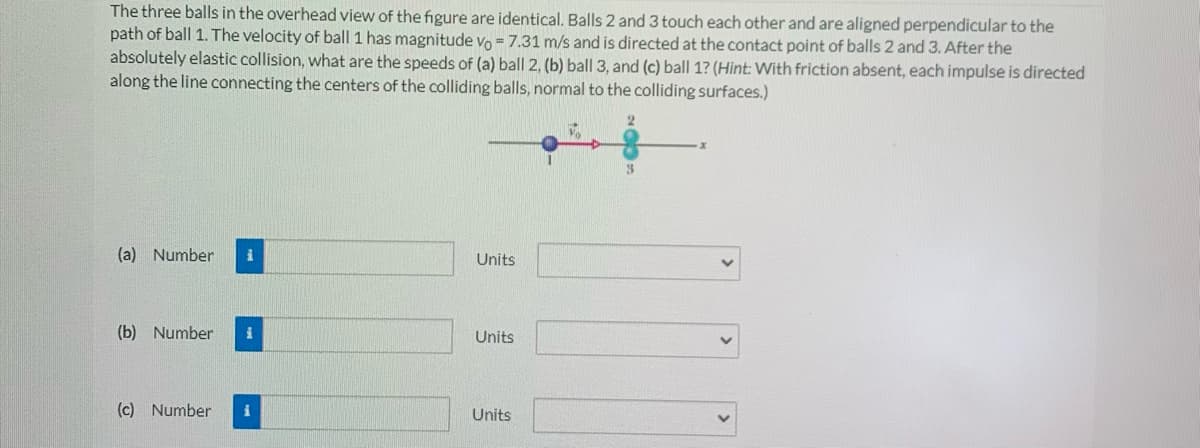The three balls in the overhead view of the figure are identical. Balls 2 and 3 touch each other and are aligned perpendicular to the path of ball 1. The velocity of ball 1 has magnitude vo = 7.31 m/s and is directed at the contact point of balls 2 and 3. After the absolutely elastic collision, what are the speeds of (a) ball 2, (b) ball 3, and (c) ball 1? (Hint: With friction absent, each impulse is directed along the line connecting the centers of the colliding balls, normal to the colliding surfaces.) (a) Number i Units (b) Number Units (c) Number i Units
The three balls in the overhead view of the figure are identical. Balls 2 and 3 touch each other and are aligned perpendicular to the path of ball 1. The velocity of ball 1 has magnitude vo = 7.31 m/s and is directed at the contact point of balls 2 and 3. After the absolutely elastic collision, what are the speeds of (a) ball 2, (b) ball 3, and (c) ball 1? (Hint: With friction absent, each impulse is directed along the line connecting the centers of the colliding balls, normal to the colliding surfaces.) (a) Number i Units (b) Number Units (c) Number i Units
Physics for Scientists and Engineers: Foundations and Connections
1st Edition
ISBN:9781133939146
Author:Katz, Debora M.
Publisher:Katz, Debora M.
Chapter10: Systems Of Particles And Conservation Of Momentum
Section: Chapter Questions
Problem 30PQ: A billiard player sends the cue ball toward a group of three balls that are initially at rest and in...
Related questions
Topic Video
Question

Transcribed Image Text:The three balls in the overhead view of the figure are identical. Balls 2 and 3 touch each other and are aligned perpendicular to the
path of ball 1. The velocity of ball 1 has magnitude vo = 7.31 m/s and is directed at the contact point of balls 2 and 3. After the
absolutely elastic collision, what are the speeds of (a) ball 2, (b) ball 3, and (c) ball 1? (Hint: With friction absent, each impulse is directed
along the line connecting the centers of the colliding balls, normal to the colliding surfaces.)
(a) Number
i
Units
(b) Number
Units
(c) Number
i
Units
Expert Solution
This question has been solved!
Explore an expertly crafted, step-by-step solution for a thorough understanding of key concepts.
Step by step
Solved in 4 steps with 1 images

Knowledge Booster
Learn more about
Need a deep-dive on the concept behind this application? Look no further. Learn more about this topic, physics and related others by exploring similar questions and additional content below.Recommended textbooks for you

Physics for Scientists and Engineers: Foundations…
Physics
ISBN:
9781133939146
Author:
Katz, Debora M.
Publisher:
Cengage Learning

Classical Dynamics of Particles and Systems
Physics
ISBN:
9780534408961
Author:
Stephen T. Thornton, Jerry B. Marion
Publisher:
Cengage Learning

Principles of Physics: A Calculus-Based Text
Physics
ISBN:
9781133104261
Author:
Raymond A. Serway, John W. Jewett
Publisher:
Cengage Learning

Physics for Scientists and Engineers: Foundations…
Physics
ISBN:
9781133939146
Author:
Katz, Debora M.
Publisher:
Cengage Learning

Classical Dynamics of Particles and Systems
Physics
ISBN:
9780534408961
Author:
Stephen T. Thornton, Jerry B. Marion
Publisher:
Cengage Learning

Principles of Physics: A Calculus-Based Text
Physics
ISBN:
9781133104261
Author:
Raymond A. Serway, John W. Jewett
Publisher:
Cengage Learning

Physics for Scientists and Engineers with Modern …
Physics
ISBN:
9781337553292
Author:
Raymond A. Serway, John W. Jewett
Publisher:
Cengage Learning

Physics for Scientists and Engineers
Physics
ISBN:
9781337553278
Author:
Raymond A. Serway, John W. Jewett
Publisher:
Cengage Learning

College Physics
Physics
ISBN:
9781305952300
Author:
Raymond A. Serway, Chris Vuille
Publisher:
Cengage Learning